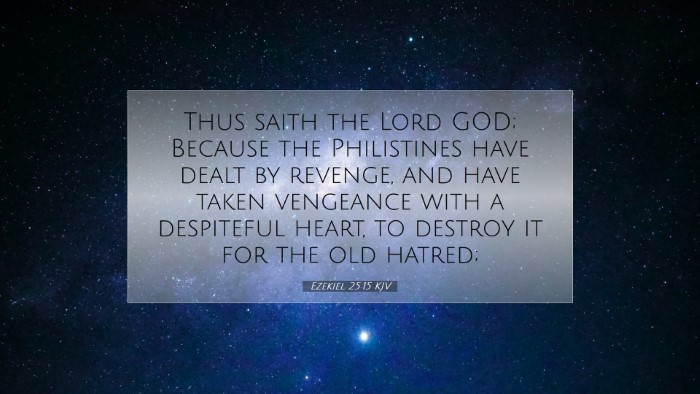Ezekiel 25:15 - Commentary and Insights
Ezekiel 25:15 presents a solemn prophecy against the Philistines, emphasizing God's judgment upon them for their relentless antagonism toward His people. This verse encapsulates themes of divine retribution, the sovereignty of God, and the consequences of enmity against His chosen.
Text of the Verse
Ezekiel 25:15 (KJV): "Thus saith the Lord God; Because the Philistines have dealt by vengeance, and have taken vengeance with a despiteful heart, to destroy it for the old hatred."
Contextual Background
-
Historical Setting:
The Philistines were a people often in conflict with the Israelites, representing a perennial enemy in the biblical narrative. Their longstanding animosity can be traced back to the narratives of Judges and 1 Samuel, where their oppression was notable.
-
Covenantal Framework:
Ezekiel, as a prophet, speaks within a covenantal context where God declares judgment on nations due to their treatment of Israel, His covenant people. Understanding the charges laid against the Philistines is crucial for appreciating the grace extended to Israel and the justice executed upon its enemies.
The Meaning of the Verse
This verse highlights several critical themes:
-
Divine Wrath:
According to Matthew Henry, the "vengeance" referred to is indicative of the Philistines' hostile actions, reflecting both their hatred towards Israel and their failure to recognize God’s sovereignty.
-
Judgment Against Hatred:
Albert Barnes notes how the Philistines employed their animus not only with physical hostility but with a heart intent on destruction. Their 'despiteful heart' signifies a deep-rooted malice, indicating that the root of their actions stemmed from historical enmity toward Israel.
-
Consequences of Fury:
Adam Clarke emphasizes how this judgment serves as a reminder of the inevitable consequences that follow national hostility and oppression. God's declaration of impending punishment reflects His ultimate authority over nations and their actions.
Theological Insights
At the heart of Ezekiel 25:15 lies several theological implications for contemporary readers:
-
The Nature of God’s Justice:
The passage reveals God's disposition toward justice and righteousness. It illustrates that His patience has limits, and that while nations may rise against His people, they will ultimately fall under divine judgment for their actions.
-
The Role of Israel in God’s Plan:
This verse must be understood in the larger narrative concerning Israel's role in God's plan of redemption. God’s judgment on the Philistines does not merely serve to vindicate Israel but highlights God's overarching sovereignty over all nations.
Application for Today’s Believers
The relevance of Ezekiel 25:15 extends beyond its historical context:
-
Reflect on Personal Hatreds:
Believers are called to examine any root of bitterness or vengeance within their hearts. This verse serves as a warning against harboring animosity that could lead to spiritual destruction.
-
Recognize God’s Sovereignty:
Modern readers are encouraged to trust in God's ultimate authority. Nations may seem powerful and unjust; however, God's providence presides over all, and eventual justice will prevail.
Conclusion
The proclamation in Ezekiel 25:15 stands as a potent reminder of God's justice in the face of oppression. It challenges believers to reflect on their own hearts and relationships while recognizing God’s sovereignty over the affairs of mankind. This verse not only serves to declare judgment upon the Philistines but also calls forth a deeper understanding of God’s righteousness and the expectation of justice for His people.


